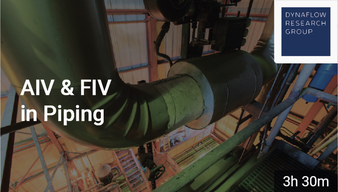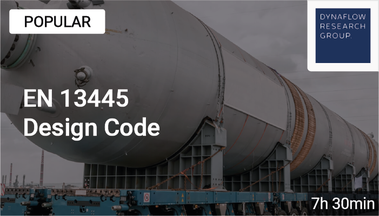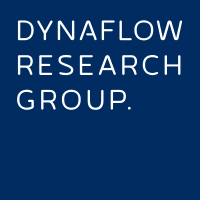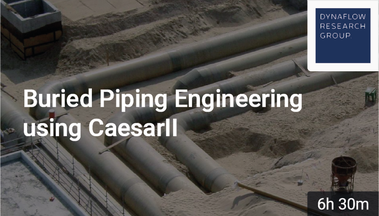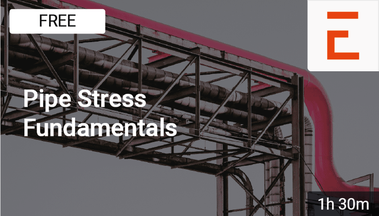Pipe Stress Analysis according to ASME B31.3 and EN 13480
Starts 8 May 2024
2 to 3 hours per week
7 week program
31 credits
Hybrid Course
HYB114
Format:
Instructor-led
€1240 For Teams
Get a 20% discount on all courses for you and your team.
FREE Course Preview
Help yourself with your purchasing decision. Watch free content now.
Course Objective
"To provide a deep understanding of the theory, design codes and methodologies required to perform pipe stress analysis and to enhance the student's engineering judgment."
This is not a pushing-buttons-in-software course!
Remote learning
100% online program
Start date to be released
7 week program
Training by Experts
1-year unlimited access
Digital Personal Certificate
to prove your skills
About the course
HYBRID
8 May 2024
7 weeks
7 modules
2-3 hrs/wk
English
Limited seats
HYB114
The course starts with a basic introduction of the physics, concepts and equations relevant for pipe stress analysis. With this foundation the course slowly builds towards performing a basic pipe stress analysis by hand in the context of both the commonly used ASME B31.3 and EN13445 design codes. Note that this course does not teach you how to use pipe stress software, but focuses on understanding the theory behind it.
This course utilizes videos, exercises, live sessions and workshops, quizzes and more to provide a steep learning curve and progress the participant’s engineering judgment.
After this course the participant has a solid understanding of pipe stress engineering and is able to apply them when designing a system.
After the course you maintain 1-year unlimited access to the course and the discussions forum. This allows you to perform modules again when you need to refresh the knowledge for your projects.
Join the Program
Team or Personal
Enroll directly using the Add-to-Cart button at the top of this page. Pay by creditcard, PayPal, or bank transfer.
Need your employer to process the payment? Use the link below.
To register multiple team-members at once, use the link below.
For the in-company training, please contact us.
Meet your instructors
the 7-week Program
Instructor & student introductions
Course details & schedule
Using the Course Forum
Certificate requirements
Learning objectives
Q&A
Module introduction
Basic definitions and relations
Geometric properties of piping
Typical properties of piping
Forces and moments on pipes
Introduction to stress
Pipe stress directions
Hoop stress
Axial stress
Radial stress
External forces and bending moments
Shear stress
Stress/strain theory
Piping codes
Introduction to code stress
Material Codes
Allowable values according to codes
Summary
Module introduction
Basic definitions and relations
Straight pipe
Thin walled vs thick walled
Bends, Reducers and Tees
Flanges
Valves
Nozzles
Summary
Summary Lecture: 3D Stress State
Group Discussion: How to evaluate high stress?
Discussing questions from Course Forum
General Q&A
Module introduction
Basic definitions and relations
Support types
Stiffness, gaps and friction
Spring supports
Steel structures
Process conditions
Imposed displacements
Occasional loads
Supporting a simple system
Summary
Module introduction
Basic definitions and relations
Load types
Failure mechanisms
Sustained Loads
Occasional loads
Operating Loads
Expansion
Fatigue
Load cases
Summary
Summary Lecture: Failure checks
Group Discussion: Allowable values & safety factors
Discussing questions from Course Forum
General Q&A
Module introduction
Basic definitions and relations
Flexibility analysis
Stress Intensification Factors (SIFs)
Code stress definition
Overview code stress & allowable values
Nozzle check
Flange check
Support check
Displacements
Piping stress software
Summary
Module introduction
Basic definitions and relations
Solution Process
Identification of overstressed locations
Application of more detail in model
Design improvements
Expansion loops
Bellows
Summary
Summary Lecture: 3D Stress State
Group Discussion: How to evaluate high stress?
Discussing questions from Course Forum
General Q&A
Module introduction
Basic definitions and relations
Reporting a Pipe Stress Analysis
Fiberglass Reinforced Plastic (FRP) Piping
Buried piping systems
Water hammer phenomena
Summary
Summary Lecture: Support placement best practices
Group Discussion: Reducing nozzle loads
Discussing questions from Course Forum
General Q&A
Congratulations
Course evaluation survey
Your Personal Certificate
Rate this course
Related resources & follow up
Results
After this course, you...
Understand the physics and equations behind pipe stress analyses.
Know how to determine material allowable values.
Have a general understanding about supporting and piping equipment.
Know which load cases are relevant for a pipe stress analysis.
Have seen the different failure mechanisms that can occur in piping systems.
Can perform a basic pipe stress analysis based on the EN 13480 and B31.3 by hand.
Have a good overview of what different analyses are required for a complete pipe stress analysis.
Understand the solution strategies to mitigate excessive pipe stresses or loads.
Who should attend this course
Junior pipe stress engineers with 0-3 years experience.
Those using pipe stress software that want to know what is behind the analysis.
Pipe designers that want to increase their analysis capabilities.
Those performing analyses using the EN 13480 and ASME B31.3.
Experienced pipe stress engineers that want to refresh their knowledge.
Prerequisites: Basic understanding of piping systems is beneficial.
Level: Intermediate
Drip Schedule
The relevant items of the course, including the links for the live sessions, are provided through a drip schedule, meaning that modules will become available step-by-step as the course progresses. The pace is set up to around 1 Module per week for a period of 7 weeks resulting in a time investment of approximately 2 - 4 hours per week. Some weeks include self-paced learning, others both self-paced as live events as per the program.
Content
The course utilizes pre-recorded videos, exercises, live Q&A's and workshops, quizzes and more, most of which are to be performed on the EngineeringTrainer learning platform and to be discussed in the live sessions. Live events are provided through MS Teams for which links will be distributed from the course and recordings are made available from your dashboard. Note that no downloadable manual is available for this course as it is completely provided through our interactive portal.
You receive 1-year unlimited access to the course. This allows you to perform modules again should you need to refresh knowledge for your work projects.
Course start date: 8 May 2024
| Part 1 | Kick-off (0.5hr) | Wednesday 8 May 2024, 10am CEST(convert time-zone) |
| Module 1 available in portal | Wednesday 8 May 2024 | |
| Part 2 | Module 2 available in portal | May 8 May 2024 |
| Session A (1 hr) | Thursday 16 May 2024 ,10am CET(convert time-zone) | |
| Part 3 | Module 3 available in portal | Thursday 16 May 2024 |
| Part 4 | Module 4 available in portal | Thursday 16 May 2024 |
| Session B (1 hr) | Thursday 23 May 2024, 10am CEST(convert time-zone) | |
| Part 7 | Module 5 available in portal | Thursday 23 May 2024 |
| Part 6 | Module 6 available in portal | Thursday 23 May 2024 |
| Workshop (2 hr) | Thursday 6 June 2024, 10am CEST(convert time-zone) | |
| Part 7 | Module 7 available in portal | Thursday 6 June 2024 |
| Session C 1 (hr) | Thursday 13 June 2024, 10am CEST (convert time-zone) |
After the course you receive 1-year unlimited access to all course material including recordings of the live sessions. This allows you to watch recording of lectures again whenever you need to refresh knowledge for your daily work projects.
Example Certificate:
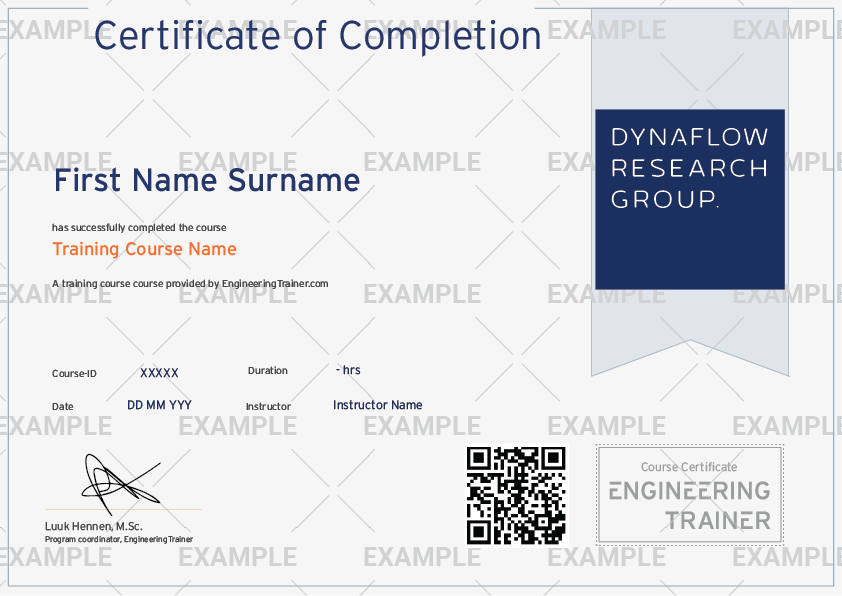
Join the Program
Team or Personal
Enroll directly using the Add-to-Cart button at the top of this page. Pay by creditcard, PayPal, or bank transfer.
Need your employer to process the payment? Use the link below.
To register multiple team-members at once, use the link below.
For In-company training, please contact us.
FAQ
Video lectures and animations,
Calculation exercises (hand calculations),
Instructor-led live sessions with lectures, group discussions, exercises and Q&A's,
Interactive slides & quizzes,
Discussion forum with other participants & instructor.
Please note that for privacy reasons no recordings of the live sessions are made or provided.
The training material used in the live sessions, for example the slides or exercises, will be available in the EngineeringTrainer portal for a year after the date of the training allowing you to refresh your knowledge or review material if needed.
During this course you will be guided through the learning content using different interactive online formats which are not downloadable, but directly available through your account on EngineeringTrainer.com.
Summary sheets are provided at the end of each module which are available for download.
You receive 1-year unlimited access to the course. This allows you to watch content again if this is beneficial for your work projects.
Please note that for privacy reasons no recordings of the live sessions are made or provided.
For sure!
During the live events you can connect directly with the Instructor and Program Manager.
Additionally, there is a Discussion Forum available through which questions can be discussed between students and the instructor.
To respect the privacy of the participants the live sessions will not be recorded, and as such the live sessions cannot be played back. Therefore it is important for all participants to block the time slots of the live sessions in their calendars and be present.
No software is required for participants of this course.
Self-paced Modules
If your computer and internet connection are able to play videos online and have MS Teams calls you will be able to follow the course. Note that almost all browsers are supported, except for Internet Explorer.
Live sessions
Live events are provided by means of Microsoft Teams. Hence it required to have an MS Teams account. Additionally, a webcam and microphone are mandatory for the live events. Separate earplugs are recommended as to avoid sound echo.
Yes, this course qualifies for PDH hours as per the NCEES CPC Guidelines.
Once the user has seen at least one product this snippet will be visible.
Recommended for you
Related Courses
